Last Saturday, I attended the annual Fall Forum hosted by the Colorado Association for Music Therapy (CAMT). The Fall Forum is primarily an educational event and CAMT invites different speakers to talk on topics related to music therapy.
One of the speakers this year was Dr. Blythe Lagasse, a professor at Colorado State University. I really enjoy hearing Blythe speak. She has a wonderful talent for explaining complex topics in a very user-friendly, easy-to-understand way.
On Saturday Blythe talked about what it needed to identify and assess the quality of research. A major buzzword in the health-care field is “evidence-based practice,” or making sure that there is research supporting the interventions you are applying, whether you be a music therapist, physical therapist, or doctor. And not only that the research has been done, but that your therapeutic work is based on the research.
It’s not always easy. On the one hand, it’s our professional responsibility as a clinician to keep up with the latest research in the field. On the other hand, many of us are out of practice reading research and, quite frankly, it’s hard to find the time.
So Blythe offered a great system for easily understanding quality research. And although it’s beyond the scope of this article to re-hash all of her information (hmmm…maybe I can ask her to write a guest post?), I did want to tell you about three cool resources she shared that I hope might benefit you:
Google Scholar
Okay, seriously, what can’t Google do? Apparently Google has a “scholar” search engine you can use to find research articles. Use Google Scholar to easily search for research by topic, keeping in mind that most of the time you will only get an abstract and not the full text for the article.
It’s easy to find–click on the “more” tab at the top of your screen and scroll down to “Scholar.” Type your topic in the search engine and go!
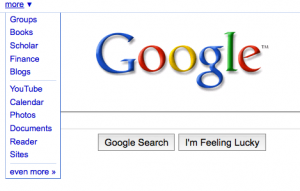 As an example, I typed in “music therapy pain” and got these results:
As an example, I typed in “music therapy pain” and got these results:
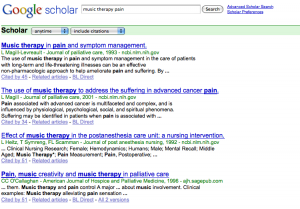 Note that for every article Google finds, it not only lists the title, authors, and a brief description, but there’s a link that reads “Cited by (#).” This tells you the number of articles that use (“cite”) that particular study. It’s generally a good thing for research to be cited by others.
Note that for every article Google finds, it not only lists the title, authors, and a brief description, but there’s a link that reads “Cited by (#).” This tells you the number of articles that use (“cite”) that particular study. It’s generally a good thing for research to be cited by others.
PubMed
PubMed (found here: http://www.ncbi.nlm.nih.gov/pubmed/) is Blythe’s recommendation for a free online research database. As with Google Scholar, you can do a basic search for research articles by topic area.
Again, as with Google Scholar, most of the time you’ll only be given access to the abstract. BUT–the really cool thing about PubMed is this “Free Full Text” tab you see at the topic of the search results:
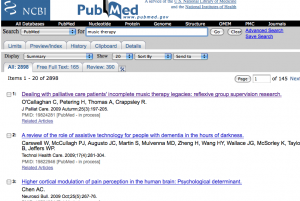
“Full text” means you can read the entire article, not just the abstract and “free” means, well…free. Click on the “Free Full Text” tab to see which articles from that search you can have access to in full.
Impact Factor (IF)
The IF is to research journals what Technorati is to blogs.
The IF is calculation for rating the strength of a research journal (not an article, an entire journal) compared to other journals in a similar topic area. Generally speaking, the higher the ranking, the better the journal. Keep in mind, though, that there is some controversy as to the validity and potential misuse of this tool.
To check out a journal’s IF, go to www.sciencegateway.org and click on the “rank” tab. You’ll be taken to a list of topic areas. Click on your topic area of choice and you’ll find a list of journals in that area. The journals at the top have the higher IF ranking.
As an example, here are the top journals in Neuroscience:
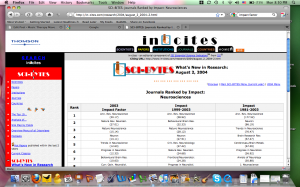
And, finally, just for fun, I looked up my Master’s thesis on Google Scholar. It was published in the Journal of Music Therapy. And it’s there!
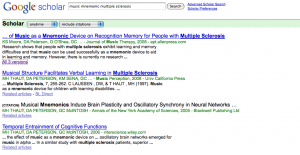
I am very excited to announce that I’ve finished my very first ebook! It’s titled Music Therapy Maven’s Productivity Primer: 7 Tips to Help YOU Do More in Less Time and it can be yours FOR FREE by entering your email address here:
Here’s to your increased productivity!


 orcid.org/0000-0001-8665-1493
orcid.org/0000-0001-8665-1493






{ 0 comments… add one now }
You must log in to post a comment.